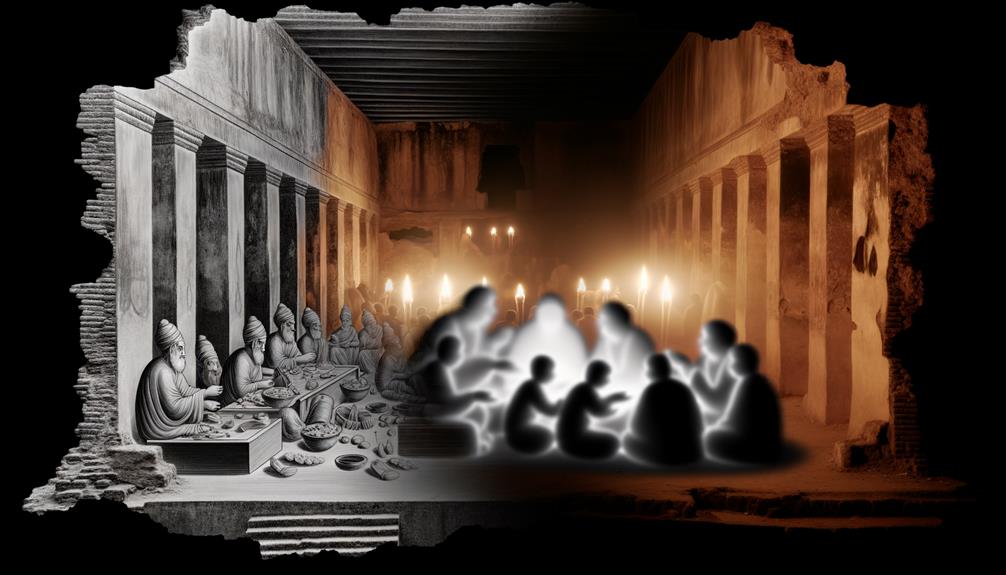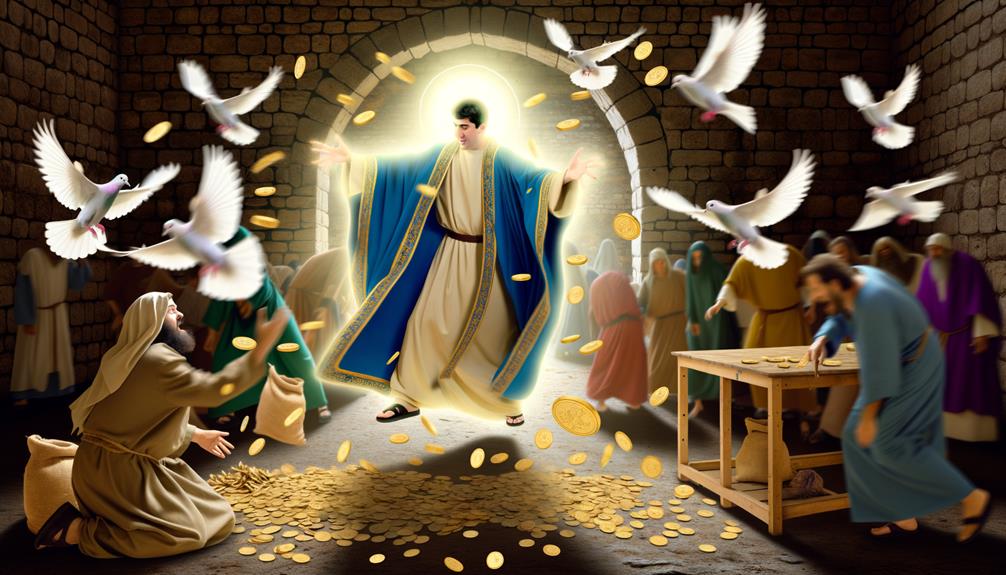Den of Thieves Bible Meaning: Corruption in the House of God
The phrase “den of thieves” originates from Jesus’ act of cleansing the Temple, documented in Matthew 21:13, Mark 11:17, and Luke 19:46. This event condemned economic exploitation and the desecration of a sacred space.
Merchants and money changers were criticized for transforming the Temple into a commercial hub, undermining its intended purpose of worship. Historically, this reflects Second Temple period practices where financial manipulation burdened worshippers.
Theologically, it underscores the need for purity and integrity within religious practices. This powerful critique addresses both spiritual corruption and institutional hypocrisy, revealing deeper insights into the relationship between faith and morality.

Key Takeaways
- The phrase ‘den of thieves’ originates from Jesus’ cleansing of the Temple, condemning merchants and money changers.
- It appears in Matthew 21:13, Mark 11:17, and Luke 19:46, highlighting the need for integrity in religious practices.
- The term critiques institutional corruption and economic exploitation within sacred spaces during the Second Temple period.
- Jesus’ actions symbolize the condemnation of commercializing worship and the call for spiritual and ethical reform.
Origin of the Phrase

The phrase ‘den of thieves‘ originates from the New Scriptures of the Bible, specifically in the accounts of Jesus cleansing the Temple, where He condemns the merchants and money changers for turning a house of worship into a marketplace of dishonesty and corruption.
This dramatic episode is recorded in the Synoptic Gospels and serves as a pivotal moment in Jesus’ ministry.
Theologically, this phrase underscores the sanctity of religious spaces and the moral imperative to maintain their purity.
Historically, the Temple acted as the epicenter of Jewish religious life.
Jesus’ actions were a radical denunciation of the exploitation occurring under the guise of piety.
The phrase consequently conveys a profound critique of institutional corruption and a call to uphold ethical integrity.
Scriptural References

Examining the scriptural references, the phrase ‘den of thieves’ prominently appears in Matthew 21:13, Mark 11:17, and Luke 19:46, each depicting Jesus’ condemnation of the unethical practices within the Temple. These verses highlight Jesus’ anger at the commercialization of sacred spaces, reflecting a profound theological critique.
| Scripture | Passage | Key Theme |
|---|---|---|
| Matthew 21:13 | “My house will be called a house of prayer, but you are making it a den of thieves.” | Condemnation of corruption |
| Mark 11:17 | “Is it not written: ‘My house will be called a house of prayer for all nations’? But you have made it a den of thieves.” | Inclusivity and holiness |
| Luke 19:46 | “It is written, ‘My house will be a house of prayer’; but you have made it a den of thieves.” | Sacredness of worship |
These passages emphasize the sanctity of worship and the need for integrity within religious practices.
Historical Context

The phrase ‘den of thieves,’ as used by Jesus in the Gospels, must be understood against the backdrop of the economic exploitation rampant in the Temple precincts during the Second Temple period.
Merchants and money changers exploited pilgrims through inflated prices and unfair currency exchanges, turning a sacred space into a center of corruption.
Jesus’ righteous anger was consequently directed not merely against commercial activity, but against the desecration of a holy space and the social injustices it perpetuated.
Temple Economic Exploitation
Economic exploitation within the Temple, particularly during the Second Temple period, reveals a complex interplay between religious authority and financial practices that often marginalized the faithful. The Temple authorities were known to levy exorbitant fees for sacrificial animals and currency exchange, a practice that strained the economic capacity of ordinary worshippers. This economic burden created a system where the religious elite profited at the expense of the devout.
| Aspect | Practice | Impact on Worshippers |
|---|---|---|
| Animal Sacrifices | Overpricing of approved animals | Financial strain |
| Currency Exchange | High exchange rates for Temple coinage | Economic exploitation |
| Entrance Fees | Fees for Temple access | Restricted worship access |
| Pilgrimage Requirements | Mandatory offerings | Increased financial burden |
| Market Regulations | Monopolistic practices | Limited fair market choices |
This environment fostered resentment and highlighted the tension between spiritual ideals and economic realities.
Jesus’ Righteous Anger
Against this backdrop of economic exploitation and religious profiteering, Jesus’ righteous anger emerges as a profound response to the desecration of sacred space and the marginalization of sincere worshippers.
His actions in the Temple are not merely spontaneous outbursts but deeply rooted in Jewish prophetic traditions. Jesus’ cleansing of the Temple can be understood through:
- Historical Context: The Temple, a central place of worship, had become a marketplace, alienating genuine seekers of God.
- Theological Insight: Jesus’ actions reaffirm the sanctity of worship spaces, reflecting God’s desire for pure, unadulterated devotion.
Jesus’ actions are therefore a clarion call for spiritual and ethical reform.
Jesus’ Temple Cleansing

How does the dramatic event of Jesus’ cleansing of the temple provide a profound theological statement on the sanctity of worship and the corruption of religious practice?
This pivotal moment, recounted in all four Gospels, underscores the sanctity of the temple as a house of prayer, not a marketplace.
Historically, the temple had become a center for commercial activities, overshadowing its sacred purpose.
Jesus’ forceful expulsion of money changers and merchants symbolized his condemnation of the exploitation and commercialization that had infiltrated religious life.
Theologically, it affirmed the need for purity in worship and the rejection of practices that distort divine intent.
His actions were a clarion call for authentic, unblemished devotion, restoring focus on spiritual integrity over material gain.
Symbolism and Imagery

The phrase ‘den of thieves‘ evokes potent imagery and symbolism that underscores the desecration of a sacred space, where commercial activities and exploitative practices profane a site meant for divine worship.
Historically, this critique highlights the commercialization of religious practices, transforming a house of prayer into a marketplace driven by profit rather than piety.
Theologically, it exposes a deeper spiritual corruption, illustrating how material greed can pervert religious integrity and lead to a fundamental breach of sacred trust.
Sacred Space Profaned
In the biblical narrative, the phrase ‘den of thieves’ serves as a powerful symbol for the desecration of sacred space, reflecting both historical and theological dimensions of temple worship and its corruption. This imagery underscores the transformation of a holy sanctuary into a place of moral and spiritual decay.
- Historical context: The temple served as the epicenter of Jewish religious life, intended for worship and communion with God.
- Theological insight: Its corruption signifies a breach in the covenantal relationship between God and His people.
This symbolic language bridges the gap between historical events and enduring theological principles.
Commercialization of Worship
As the sacred space of the temple became increasingly profaned, the commercialization of worship emerged as a poignant symbol of its moral degradation and betrayal of divine intent.
This phenomenon is historically rooted in the transformation of the temple courtyards into bustling marketplaces, where merchants and money changers conducted transactions.
Theologically, this shift represents a deviation from the temple’s primary purpose of facilitating genuine spiritual communion with God. Instead, economic activities overshadowed worship, reducing sacred rituals to mere commercial exchanges.
The imagery of a ‘den of thieves‘ vividly captures this desecration, highlighting the stark contrast between the temple’s intended sanctity and its corrupted state.
This commercialization is a compelling symbol of the broader moral and religious decline within the community.
Spiritual Corruption Exposed
Through the vivid symbolism of a ‘den of thieves,’ the narrative reveals the profound spiritual corruption that had infiltrated the temple, transforming it from a place of worship into a hub of exploitation and deceit.
This stark imagery underscores the theological and ethical decay present within the religious leadership. Historically, the temple had been a sacred space dedicated to divine communion, yet it became marred by greed and immorality.
- Exploitation of worshippers: Priests and merchants profited from the sacrificial system.
- Desecration of sacred space: Commercial activities overshadowed spiritual sanctity.
This critique reflects a broader condemnation of the systemic corruption that Jesus sought to eradicate, advocating for a return to genuine piety and reverence.
Critique of Hypocrisy

A critical examination of the phrase ‘den of thieves’ reveals a profound denunciation of religious leaders’ hypocrisy, particularly in their exploitation of sacred spaces for personal gain. This term, originating from Jesus’ cleansing of the temple, underscores the betrayal of divine sanctity by those entrusted with its protection. Historical context reveals that the temple, meant to be a house of prayer, became a marketplace, symbolizing spiritual decay. Theologically, this critique exposes a stark contrast between outward piety and inner corruption.
| Hypocrisy Revealed | Emotional Impact |
|---|---|
| Sacred Profaned | Betrayal |
| Outward Piety | Disillusionment |
| Inner Corruption | Anguish |
| Exploitation | Anger |
| Divine Betrayal | Sorrow |
Understanding this critique is essential for grasping the gravity of religious hypocrisy.
Corruption Among Leaders

Historical accounts consistently reveal that corruption among religious leaders has been a pervasive issue, undermining the moral and spiritual integrity of religious institutions. This corruption often manifests in various forms, including:
- Financial Misappropriation: Diverting funds intended for charitable activities to personal use.
- Moral Failings: Engaging in unethical behavior, contradicting the teachings they profess.
These instances of corruption are not merely historical anomalies but recurring themes that reflect deeper systemic issues within religious frameworks.
Such malfeasance erodes trust, diminishes the moral authority of religious leaders, and often leads to significant spiritual disillusionment among followers.
Understanding these patterns is essential for both historical analysis and contemporary reflection.
Theological Interpretations

The phrase ‘den of thieves,’ as used in biblical texts, carries profound theological implications that extend beyond its immediate context, revealing insights into divine judgment against corruption and the desecration of sacred spaces. This phrase, attributed to Jesus in the Gospels, highlights the tension between earthly greed and spiritual sanctity. Theologically, it underscores God’s intolerance for hypocrisy and exploitation, particularly within holy settings.
| Concept | Biblical Reference | Theological Insight |
|---|---|---|
| Divine Judgment | Jeremiah 7:11 | Denouncement of false piety and systemic corruption. |
| Sacred Spaces | Matthew 21:13 | Emphasis on the sanctity of places of worship. |
| Hypocrisy | Mark 11:17 | Condemnation of religious leaders exploiting faith. |
| Spiritual Sanctity | John 2:16 | Purification of holy sites from commercial interests. |
| Righteous Anger | Luke 19:45-46 | Justification for righteous indignation. |
This table elucidates key theological dimensions of the ‘den of thieves’ concept.
Modern-Day Relevance

In contemporary society, the phrase ‘den of thieves’ still resonates profoundly, reflecting ongoing issues of corruption, greed, and the misuse of positions of power within both religious and secular institutions.
Historically, this term has been used to critique moral decay and ethical lapses. Its modern-day relevance is evident in various contexts:
- Political Scandals: Revealing systemic corruption within governments undermines public trust.
- Corporate Malfeasance: Exploitation of financial systems for personal gain highlights ethical breaches.
These instances illuminate how the ancient critique remains pertinent, urging vigilance and reform.
Theologically, it serves as a caution against deviating from moral teachings, emphasizing the timeless struggle for integrity and righteousness.
Conclusion
The phrase ‘den of thieves,’ deeply rooted in biblical scripture, serves as a scathing symbol of spiritual and moral corruption.
Through historical context and theological critique, it underscores the hypocrisy and exploitation by religious and political leaders.
Jesus’ cleansing of the temple acts as a powerful protest against such practices.
This evocative imagery continues to challenge contemporary contexts, calling for a conscientious commitment to integrity and righteousness in both personal and communal spheres.






